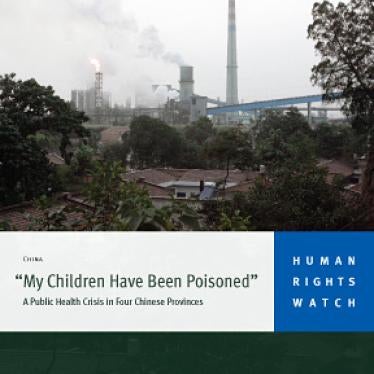Another village was poisoned last month. More than 300 people, including 99 children, were diagnosed with acute lead poisoning in Zhejiang province. Unfortunately, entire villages being poisoned by lead from battery factories or lead smelters is not unusual-in the last year alone mass poisonings in six provinces have been reported in central and southern China.
In the past, there was little response to these industrial catastrophes; at best the factory responsible might be temporarily closed or the factory owner might pay a small fine. This time, the factory was shut down, and the Ministry of Environmental Protection pledged to pursue criminal penalties for factory bosses and local officials who ignored environmental regulations.
These announcements would seem to reflect the Chinese government's concern about the country's lead poisoning epidemic, and its determination to get it under control. If so, that is good news. But the government has a lot of work to do to address the hundreds of thousands of people across China already exposed to toxic levels of lead poisoning. Lead poisoning is occuring in China not just in high profile incidents like the one in Zhejiang, but also insidiously, through chronic, long-term exposure to lead from smoke-stacks, lead paint and coal burning.
Lead poisoning can cause permanent physical and cognitive disability, and at stake here are millions of children: China's future. Xiao Bao, a two-year-old in Hunan province, is suffering the consequences of government inaction. Standing in front of her home, close to the village smelter, Xiao Bao's mother listed her son's symptoms that suggested lead poisoning: constant fever, no appetite, sluggish and agitated. But there is no help for Xiao Bao. Neighbours have been arrested for travelling outside of the village seeking help and redress, and now everyone, including Xiao Bao's mother, is too scared of government retribution to keep asking for help for what she suspects is lead poisoning.
A new report by Human Rights Watch, published last week, details the extent to which parents have been stonewalled by the government when trying to help their sick children. Rather than provide care for children with lead poisoning, local governments across China have denied the scope of the epidemic and threatened those who wish to speak out.
The trajectory of China's lead poisoning epidemic is reminiscent of other Chinese public health crises over the last decade, with the repeating themes of corruption, cover up and harassment. If Chinese leaders want to signal a new commitment to addressing this massive problem, a welcome first step would be to stop harassing and intimidating parents who have spoken out or simply tried to get help for their sick children. Beijing must also end the on-going harassment by police of journalists trying to report on lead poisoning. Also worrying is the "disappearance" of a lead poisoning activist.
China's leaders must go much further than shutting down factories already known to cause harm. They should make sure children are not living in the midst of toxic pollution. That means shutting down polluting factories for good, remediating contaminated villages or, with community participation and input, moving families facing harm to safer areas.
Addressing the pervasive damage from lead resulting from years of failure to balance industrial development against the basic rights to health and well-being of ordinary citizens will be costly, both in terms of time and money. What costs no money, but plenty of political will, is allowing the open debate critical to ensuring that this issue gets the attention it needs and that those responsible for the problem are held accountable. Failing to enforce existing environmental regulations and meet health and human rights obligations now will in the end cost China far more-in renminbi and in lives.
Joe Amon is health and human rights director at Human Rights Watch.







